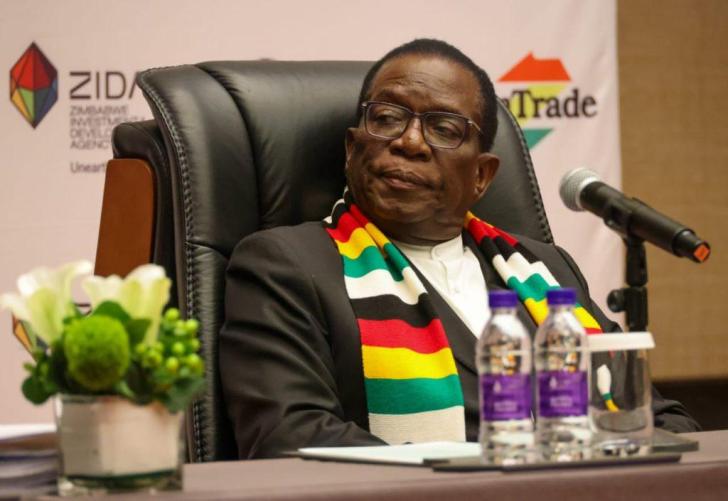News / National
Mnangagwa reaffirms Zimbabwe's commitment to Tripartite Dialogue
14 hrs ago | Views

President Mnangagwa has reaffirmed the Zimbabwean Government's dedication to maintaining dialogue under the Tripartite Negotiating Forum (TNF), an initiative praised by the International Labour Organisation (ILO) for its potential to foster economic and social stability.
ILO Director-General Mr. Gilbert Houngbo highlighted the significance of this commitment during a historic two-day working visit to Zimbabwe that concluded yesterday. His visit marked the first by an ILO leader to the country, underscoring its importance in advancing labour-related collaboration.
In a closed-door meeting with President Mnangagwa at State House in Harare, Mr. Houngbo said the discussions were productive, emphasizing Zimbabwe's progress in economic stabilization and policy initiatives such as the introduction of a gold-backed currency.
"I am very glad that His Excellency insisted a lot on the importance of continued dialogue in a very positive manner in the TNF, which is very important," Mr. Houngbo said. "For us, it is important to ensure that we remain focused on the ILO mandate and the excellent partnership we have with the authorities through the Ministry of Labour."
Mr. Houngbo expressed optimism about the TNF's strategic role in fostering political and social stability, key drivers for sustainable development. "Both political and social stabilities are quite important for any development," he noted, lauding the "positive mood and predisposition" of Zimbabwe's social partners during engagements.
The ILO chief also emphasized the importance of addressing labour migration patterns to mitigate brain drain while balancing the benefits of diaspora remittances, which contribute approximately US$2 billion annually to Zimbabwe's economy.
"It's important to establish a balanced way. I keep saying that brain power is one of the comparative advantages of Zimbabwe, and we must ensure it does not result in a brain drain," Mr. Houngbo explained. He advocated for circular labour migration as a solution, allowing skills to flow while maintaining the country's human capital.
During his visit, Mr. Houngbo met with government officials, business leaders, and workers' representatives, touring key sites such as the Geo Pomona Waste Management Facility, the New Parliament Building, and the Museum of African Liberation.
Reflecting on the visit, he described it as "very successful and rich," noting the non-stop engagements since his arrival on Sunday.
Mr. Houngbo's visit strengthens Zimbabwe's ties with the ILO, reaffirming mutual goals of enhancing labour standards and economic resilience. The discussions also underscored the importance of collaboration in addressing challenges such as economic stabilization, labour mobility, and sustainable development.
With the TNF as a cornerstone, Zimbabwe continues to chart a path toward inclusive growth, supported by its partnerships with international institutions like the ILO.
ILO Director-General Mr. Gilbert Houngbo highlighted the significance of this commitment during a historic two-day working visit to Zimbabwe that concluded yesterday. His visit marked the first by an ILO leader to the country, underscoring its importance in advancing labour-related collaboration.
In a closed-door meeting with President Mnangagwa at State House in Harare, Mr. Houngbo said the discussions were productive, emphasizing Zimbabwe's progress in economic stabilization and policy initiatives such as the introduction of a gold-backed currency.
"I am very glad that His Excellency insisted a lot on the importance of continued dialogue in a very positive manner in the TNF, which is very important," Mr. Houngbo said. "For us, it is important to ensure that we remain focused on the ILO mandate and the excellent partnership we have with the authorities through the Ministry of Labour."
Mr. Houngbo expressed optimism about the TNF's strategic role in fostering political and social stability, key drivers for sustainable development. "Both political and social stabilities are quite important for any development," he noted, lauding the "positive mood and predisposition" of Zimbabwe's social partners during engagements.
"It's important to establish a balanced way. I keep saying that brain power is one of the comparative advantages of Zimbabwe, and we must ensure it does not result in a brain drain," Mr. Houngbo explained. He advocated for circular labour migration as a solution, allowing skills to flow while maintaining the country's human capital.
During his visit, Mr. Houngbo met with government officials, business leaders, and workers' representatives, touring key sites such as the Geo Pomona Waste Management Facility, the New Parliament Building, and the Museum of African Liberation.
Reflecting on the visit, he described it as "very successful and rich," noting the non-stop engagements since his arrival on Sunday.
Mr. Houngbo's visit strengthens Zimbabwe's ties with the ILO, reaffirming mutual goals of enhancing labour standards and economic resilience. The discussions also underscored the importance of collaboration in addressing challenges such as economic stabilization, labour mobility, and sustainable development.
With the TNF as a cornerstone, Zimbabwe continues to chart a path toward inclusive growth, supported by its partnerships with international institutions like the ILO.
Source - The Herald















































